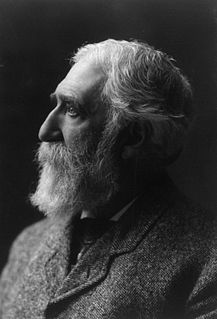A Quote by Steven Pressfield
The professional does not permit himself to become hidebound within one incarnation, however comfortable or successful. Like a transmigrating soul, he shucks his outworn body and dons a new one. He continues his journey.
Quote Topics
Related Quotes
It is God's earth out of which man is taken. From it he has his body. His body belongs to his essential being. Man's body is not his prison, his shell his exterior, but man himself. Man does not "have" a body; he does not "have" a soul; rather he "is" body and soul. Man in the beginning is really his body. He is one. He is his body, as Christ is completely his body, as the Church is the body of Christ
The fact that labour is external to the worker, i.e., it does not belong to his intrinsic nature; that in his work, therefore he does not affirm himself but denies himself, does not feel content but unhappy, does not develop freely his physical and mental energy but mortifies his body and his mind. The worker therefore only feels himself outside his work, and in his work feels outside himself.
At that instant he knew that all his doubts, even the impossibility of believing with his reason, of which he was aware in himself, did not in the least hinder his turning to God. All of that now floated out of his soul like dust. To whom was he to turn if not to Him in whose hands he felt himself, his soul, and his love?
An artist is he who has his center within himself. He who lacks this must choose a particular leader and mediator outside of himself, not forever, however, but only at first. For man cannot exist without a living center, and if he does not have it within himself, he may seek it only in a human being. Only a human being and his center can stimulate and awaken that of another.
We may treat of the Soul as in the body - whether it be set above it or actually within it - since the association of the two constitutes the one thing called the living organism, the Animate.Now from this relation, from the Soul using the body as an instrument, it does not follow that the Soul must share the body's experiences: a man does not himself feel all the experiences of the tools with which he is working.
In the absence of government each man learns to think, to act for himself, without counting on the support of an outside force which, however vigilant one supposes it to be, can never answer all social needs. Man, thus accustomed to seek his well-being only through his own efforts, raises himself in his own opinion as he does in the opinion of others; his soul becomes larger and stronger at the same time.
He who does not meditate acts as one who never looks into the mirror and so does not bother to put himself in order, since he can be dirty without knowing it. The person who meditates and turns his thoughts to God who is the mirror of the soul, seeks to know his defects and tries to correct them, moderates himself in his impulses and puts his conscience in order.
Man is a spiritual being, a soul, and at some period of his life everyone is possessed with an irresistible desire to know his relationship to the Infinite. . . . There is something within him which urges him to rise above himself, to control his environment, to master the body and all things physical and live in a higher and more beautiful world.
Someone who does not draw strength from himself and who is incapable of finding the meaning of his life within himself will...seek the map to his own orientation somewhere outside himself-in some ideology, organization, or society, and then, however active he may appear to be, he is merely waiting, depending. He waits to see what others will do, or what roles they will assign to him, and he depends on them-and if they don't do anything or if they botch things, he succumbs to disillusion, despair, and ultimately, resignation.



































